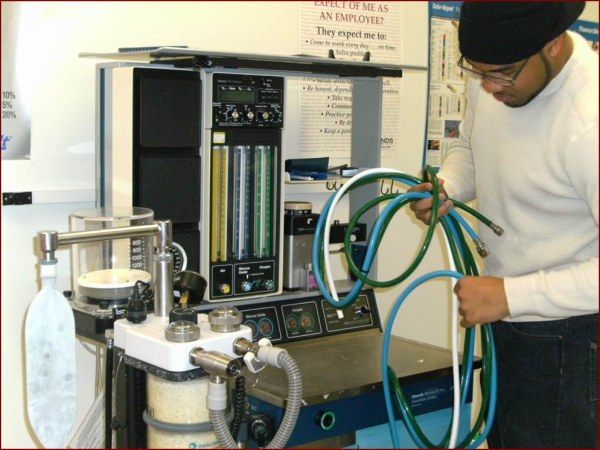


Biomedical Technology
What do you want to be when you grow up? When trying to choose a career, the most important thing you can do is to pick one that is right for you. Sounds easy doesn’t it? It’s not! When searching you need to find something that fits with your interests, aptitudes, and personality. Why? Chances are you will be satisfied with your choice and enjoy going to work. Let’s take a look at the Biomedical Technology program and see if it might be a “good fit” for you.
The Biomedical Technology program prepares individuals to become responsible for testing, repairing, and maintaining equipment used in hospitals and other medical environments by providing classroom instruction and laboratory experiences using equipment comparable to that found in industry. A graduate of this program should possess the capability of working and communicating with Biomedical Engineers, Biomedical Service Administrators, and other medical personnel.
What Medical Equipment Technicians Do?
Medical Equipment Technicians also known as biomedical equipment technicians often test and calibrate a variety of equipment used in hospitals, eye doctor and dentist offices as well as private health providers. Included but not limited to the equipment they may diagnose and repair are electric wheelchairs, CAT scanners, ultrasound equipment and defibrillators.
These technicians may use hand tools, electronic tools and computers to repair equipment. Several pieces of equipment that they repair and maintain require them to use specialized software to adjust the machines. In addition, they often perform routine scheduled maintenance on complex medical devices used by specialty practitioners.
Because repairs occasionally must take place while equipment is being used, medical equipment repairers must be comfortable working around patients in a hospital setting. Technicians must ensure that patients are not disturbed in this situation.
Essentially, medical equipment technicians typically do the following:
- Test and calibrate equipment and parts
- Replace and repair parts
- Perform preventive maintenance
- Record maintenance and repairs
- Regularly attend training sessions
- Review technical manuals
- Demonstrate and explain correct operation of medical equipment
Can I Find A Job After Graduation?
According to the Bureau of Labor Statistics, employment of medical equipment technicians is expected to grow 31 percent from 2010 to 2020, much faster than the average for all occupations. That’s pretty impressive isn’t it? Just as impressive is the national median average for persons employed in this field, $45,000. Potential employees who have an associate’s degree in biomedical technology should have the best job prospects along with applicants willing to relocate to rural areas.
The Biomedical Technology program at Hinds Community College is a reliable and thorough training ground for employment in the biomedical field. The program has an excellent reputation with local healthcare providers looking for skilled technicians. Typical positions filled by students who have completed this program include biomedical equipment technicians (BMET). Placement of students who complete the program is a top priority for instructor Jacob Wright.

Possess These Qualities? This Might Be The Right Career Choice For You!
- Dexterity
- Mechanical skills
- Stamina
- Technical skills
- Time-management skills
- Troubleshooting skills
Degree Options:
Degree options in the Biomedical Technology program include a Career Certificate option, Technical Certificate option and AAS Degree option.
This CTE program is offered only at the Raymond Campus of Hinds Community College. For more information on this program contact the program instructor, Jacob Wright at Jacob.Wright@hindscc.edu or give him a call at 601.857.3421!




